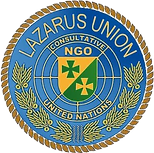UN-NGO United Nations

Thanks to his tireless support for the good of the International Lazarus Union our former General Plenipotentiary and Special Ambassador with the United Nations, Prof. Senator h.c. Wolfgang Steinhardt, has managed that the United Nations now granted the General Consultative Status to our Lazarus Union. This is a big honour for the Lazarus Union and for those who were involved in the efforts concerning the international appreciation of the Union – especially our General Secretary and Deputy General Plenipotentiary Oliver Gruber-Lavin.
Hardly anyone would have believed in 2006, when our former General Plenipotentiary founded the Lazarus Union after five years abroad, what a success his foundation would be.
Over time, this foundation became an organisation with more than 22.000 members in more than 120 countries around the world.
A first major success was reached in 2014 when the United Nations granted the „Special Consultative Status“ to the International Lazarus Union.
The International Lazarus Union never intended to rest on this laurels. The leadership of the Lazarus Union was constantly endeavoured that its humanitarian support would be appreciated at home and abroad.
That this was indeed the case can be seen from the fact that the Lazarus Union was even nominated for the Nobel Peace Prize in 2017.
Even if the current success, the granting of the “General Consultative Status”, no longer falls within the term of the office of the former General Plenipotentiary, we must never forget that it was HE who ensured that the Union has now achieved this Consultative status.
For this, he and all those who have contributed to this deserve a great deal of thanks from all the members of the Union.
At the same time, however, we are also pleased with all our critics, who have recently wanted to “sideline” us and have restricted or ended social contact with the Lazarus Union.
To all these critics, we would like to consider whether the United Nations really would have granted our Union this honorable status (there are only 137 organisations with this status in the world), even if there was only a little truth in the accusations that were being made recently – either through one-sided press coverage or through unspoken suspicions by other institutions.
The honor now granted by the United Nations shows that that we, as a Union, have never had anything to reproach for and this will be also the case in the future.
I would therefore like to appeal to all our relatives who have been sceptical about the various allegations so far:
“Do not listen to the baseless accusations and work with us for the good of humanity in accordance with our slogan
„VIRIBUS UNITIS“
Professor Dr.Dr.h.c. (UA) Lothar Gellert
General Plenipotentiary of the Lazarus Union
More about the
CONSULTATIVE STATUS of the UNITED NATIONS
(Source: Wikipedia)
Consultative Status to the United Nations Economic and Social Council (ECOSOC) is the highest status granted by the United Nations to non-governmental organizations (NGO’s), thereby allowing them to participate in the work of the United Nations. Consultative Status is divided into three categories:
-
General Consultative Status (formerly Consultative Status 1), the highest level, which may be granted to organizations that are concerned with most of the activities of the Council, that are making substantive and sustained contributions in many fields, with a considerable membership, and that are broadly representative of major segments of society in a large number of countries. These organizations are entitled to deliver oral presentations during the Council’s meetings.
-
Special Consultative Status (formerly Consultative Status 2), which may be granted to organizations concerned with only a few of the fields of activity covered by the Council.
-
Roster, which are “other organizations that do not have general or special consultative status but that the Council, or the Secretary-General of the United Nations in consultation with the Council or its Committee on Non-Governmental Organizations, considers can make occasional and useful contributions to the work of the Council.”
Twice a year, the United Nations Committee on Non-Governmental Organizations reviews new applications for consultative status and makes recommendations to the ECOSOC, which reviews and decides to approve or deny the recommendations. Almost always, these recommendations are approved. Consultative Status, depending on level, gives the organizations a number of rights to participate in the work of the UN, to present their views and deliver testimony.
The first time that non-governmental organizations were granted consultative status was in 1946, when 41 organizations were chosen. By 1996, over 1000 NGO’s were granted consultative status, and by the year 2000, there were 2050.
More than 320.000 NGO´s are listed but do not have any official status.
As of July 2018, there are a total of 5,081 organizations in consultative status with ECOSOC. There are 134 organizations in general consultative status, 3,974 in special consultative status and 973 on the Roster
The UN also maintains a database through which the current set of organizations in consultative status can be accessed.

